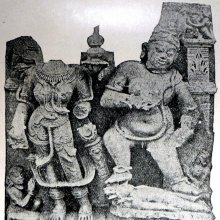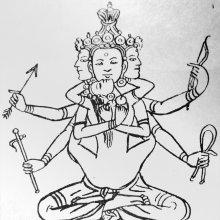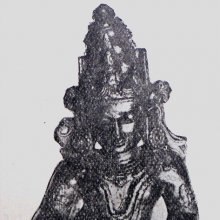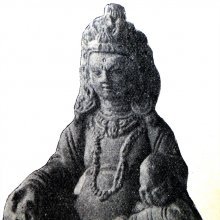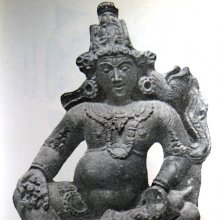Dimbha, Ḍimbha: 13 definitions
Introduction:
Dimbha means something in Buddhism, Pali, Hinduism, Sanskrit, Jainism, Prakrit, Hindi. If you want to know the exact meaning, history, etymology or English translation of this term then check out the descriptions on this page. Add your comment or reference to a book if you want to contribute to this summary article.
Dimbha has 11 English definitions available.
Images (photo gallery)
Languages of India and abroad
Sanskrit dictionary
[Deutsch Wörterbuch]
Source: Cologne Digital Sanskrit Dictionaries: Böhtlingk and Roth Grosses Petersburger WörterbuchḌimbha (डिम्भ):—
1) m. f. (ā) ein neugeborenes Kind, Kind, Junges [Amarakoṣa 2, 5, 38. 6, 1, 41. 3, 4, 22, 137.] [Hemacandra’s Abhidhānacintāmaṇi 338.] [Medinīkoṣa bh. 4. Scholiast] zu [Śāṅkhāyana’s Gṛhyasūtrāṇi 1, 25.] —
2) m. Ignorant [Amarakoṣa 3, 4, 22, 137.] [Medinīkoṣa] — Vgl. toyaḍimbha .
--- OR ---
Ḍimbha (डिम्भ):—
1) [PAÑCAR. 2, 2, 95. 99.] [HĀLA 293.] —
2) [MĀLATĪM. 84, 13.] [Sāhityadarpana 339, 9.] —
3) ungenau st. ḍimba Ei [PAÑCAR. 2, 2, 37. fg. 42. 3, 39. fg. 41.]
Source: Cologne Digital Sanskrit Dictionaries: Sanskrit-Wörterbuch in kürzerer FassungḌimbha (डिम्भ):——
1) m. — a) ein neugeborenes Kind , Kind , Knabe [Naiṣadhacarita 5,97] ( nara). [9,38.] [Bālarāmāyaṇa 61,1.107,8.108,18.] Junges [196,17.] — b) ein Ignorant. — c) ein junger Schoss [Naiṣadhacarita 8,2.] — d) Ei. —
2) *f. ā zu
1) a).
Sanskrit, also spelled संस्कृतम् (saṃskṛtam), is an ancient language of India commonly seen as the grandmother of the Indo-European language family (even English!). Closely allied with Prakrit and Pali, Sanskrit is more exhaustive in both grammar and terms and has the most extensive collection of literature in the world, greatly surpassing its sister-languages Greek and Latin.
See also (Relevant definitions)
Starts with: Dimbhabhighata, Dimbhacakra, Dimbhachakra, Dimbhadimbha, Dimbhaka, Dimbhalila.
Ends with: Brahmanadimbha, Cutadimbha, Dimbhadimbha, Ikshudimbha, Toyadimbha.
Full-text: Toyadimbha, Dimbhacakra, Dimbhaka, Toyadimba, Dimbh, Srams, Nimi, Dimbhadimbha, Ikshudimbha, Brahmanadimbha, Dimba, Abhighata, Ucchushmajambhala, Ucchushma, Sarshapa.
Relevant text
Search found 9 books and stories containing Dimbha, Ḍimbha, Ḍimbhā, Ḍiṃbha; (plurals include: Dimbhas, Ḍimbhas, Ḍimbhās, Ḍiṃbhas). You can also click to the full overview containing English textual excerpts. Below are direct links for the most relevant articles:
Garga Samhita (English) (by Danavir Goswami)
Verse 1.6.34 < [Chapter 6 - Description of Kaṃsa’s Strength]
The Indian Buddhist Iconography (by Benoytosh Bhattachacharyya)
Figure 130 - Emanations of Akṣobhya: Ucchuṣma-Jambhala
Bhakti-rasamrta-sindhu (by Śrīla Rūpa Gosvāmī)
Verse 3.4.30 < [Part 4 - Parenthood (vātsalya-rasa)]
Verse 2.4.49 < [Part 4 - Transient Ecstatic Disturbances (vyābhicāri-bhāva)]
Sahitya-kaumudi by Baladeva Vidyabhushana (by Gaurapada Dāsa)
Text 10.76 < [Chapter 10 - Ornaments of Meaning]
Text 10.134 [Svabhāvokti] < [Chapter 10 - Ornaments of Meaning]
Text 10.136 < [Chapter 10 - Ornaments of Meaning]
Trishashti Shalaka Purusha Caritra (by Helen M. Johnson)
Part 38: Rescue of Nandiṣeṇā < [Chapter II - Marriages of Vasudeva with maidens]
Yoga Vasistha [English], Volume 1-4 (by Vihari-Lala Mitra)
Chapter XXVIII - Description of bali’s anaesthesia < [Book V - Upasama khanda (upashama khanda)]
